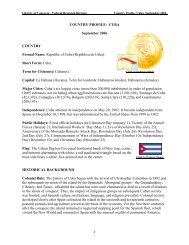1 - American Memory
1 - American Memory
1 - American Memory
Create successful ePaper yourself
Turn your PDF publications into a flip-book with our unique Google optimized e-Paper software.
52<br />
The attendees were asked whether their estimates on food are holding<br />
up, which would now be approxmately two weeks to a nonth's supply. Tliey<br />
felt that they were, although some goods are already short. Ifr. Isherwood<br />
added that sone items are getting to the critical stage; for eioople, canned<br />
baby foods. However, this oay be only on a certain brand.<br />
The group felt that local produce (vegetables and fruits) is holding<br />
vp pretty well. There are a few people raising com individually but not<br />
coianercially. Mr. Haeda mentioned that they tried getting some frozen com<br />
(com-on-the-cob) from the East Coast; however, they presently do not have<br />
com there, too*<br />
Mr. Abe stated that the Chaiaber of Coimerce took a survey in a diffsrant<br />
method. Their survey would prove that the strilce itself would hurt our<br />
economy. Raw ciaterials v;ere found to be good for only another couple of<br />
weeks. This is not true for every outfit, but for nost.<br />
Hr. Maeda asked what action is taken as a result of these forms.<br />
Mr. Isherwood replied that it is an accumulation of infonaation on what<br />
the situation is and we pass this on to the State Hesource Agency. They,<br />
in turn, determine whether they should request the Governor to take certain<br />
steps to either use barges. Federal contacts or some other means of getting<br />
materials in, particularly staples; and also the allocation of the materials<br />
throughout the state rather than perhaps just Honolulu. It would tie in<br />
with the sane procedures established during World VJar II when there were<br />
a Limited nunber of ships that could cone in. Priorities would be set on<br />
who gets what and how much and the type of raterials that could be. brought<br />
in. There v;ould be a determination on items that would not be necessary,<br />
like caviar, for example, unless the person wants to fly it in.<br />
Mr. Maeda mentioned that it seems as though air freight space is getting<br />
tight, too. Mr. Ishon.rood added that the ne-.vspaper articles mentioned that<br />
one airline is putting additional freight carrying planes on, although this<br />
seems to be only for Oahu.<br />
Mr. Abe asked about Katson. Mr. Douglass said he wishes they had<br />
Bomething positive worked out. They had hopes of providing services through<br />
Vancouver, which would be fairly e:rpensive but better than directly from<br />
the Vfest Coast; havever, so far they have not been able to do that. Seatrain<br />
is also vrorking on services out of Vancouver but i-Ir. Douglass does not have<br />
any late word on how successful they have been. This woiU.d be better than<br />
shipping out of the East Coast, Gulf Ports or air freigliting, but it still<br />
is not very fast. Hoifever, in line v.dth what [!r. Isherrfood was saying avmile<br />
ago, someday the ftriko v;ill end and when it does, the State Government will<br />
probably designate the priorities to t'atson, Seatrain and others so the more<br />
critical items could be brought in first.<br />
Hr. Abe asked that on the assumption that the strike would last, at<br />
what point would the State say the situation is critical. Mr. Isherwood<br />
replied that if we do not have any inforration, we would not bo able to<br />
eupply information on our situation; however, with the infornaticn, we can



![Albert Einstein Papers [finding aid]. Library of Congress. [PDF ...](https://img.yumpu.com/21604228/1/190x245/albert-einstein-papers-finding-aid-library-of-congress-pdf-.jpg?quality=85)





![American Colony in Jerusalem Collection [finding aid]. Library of ...](https://img.yumpu.com/17941275/1/190x245/american-colony-in-jerusalem-collection-finding-aid-library-of-.jpg?quality=85)



![Piccard Family Papers [finding aid]. - American Memory - Library of ...](https://img.yumpu.com/17941234/1/190x245/piccard-family-papers-finding-aid-american-memory-library-of-.jpg?quality=85)


